A closer look at Declan Ganley's "Libertas" campaign - the figures behind it and their motivations. 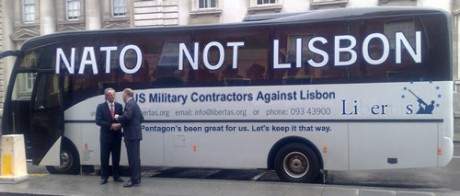
On Sunday April 20th, Libertas announced that Ulick McEvaddy was "joining the No To Lisbon Campaign" and publicised the event with a photo-opportunity of the two 'entrepreneurs' in front of the Libertas Campaign bus [1]. McEvaddy is the first member of the Irish business and political elite to join the Libertas campaign since it emerged under the stewardship of Declan Ganley.
What's particularly interesting about this is that McEvaddy is the CEO of Omega Air, a US defence contractor (they supply cargo planes and inflight refuelling services to the US military).
Declan Ganley, president of Libertas, also happens to be president of Rivada Networks, a US defence contractor (they supply emergency communications networks to the US intelligence community).
First published on indymedia.ie
Now, what's so peculiar about all of this is that there just aren't a large number of Irish people who happen to own companies whose major business is providing extremely sensitive services to the US military and intelligence community. If I were to hazard a guess, I'd say that the total population of this demographic in Ireland is 2 - although it's hard to tell since much of this sort of stuff is classified or covert. Maybe, by the end of the Lisbon campaign a whole tribe of Irish US defence contractors will emerge from the woodwork, but I doubt it.
But, anyway, back to the point, why does it matter what these guys do? Shouldn't they have a right to a say on Lisbon like everybody else? Certainly they should, but since they have stepped into the light and are taking an active role in public politics and trying to influence public decisions, it is a good idea to inform ourselves about them, to understand something about the nature of what McEvaddy and Ganley's companies do and the implications for where their loyalties are likely to lie. This article takes a look at McEvaddy, Ganley and Libertas and highlights a few facts which may give a clue as to their motives in entering the political arena.
McEvaddy & Omega Air
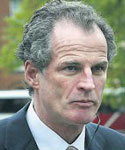 Ulick McEvaddy
Ulick McEvaddy
Ulick McEvaddy is what you might call a shady character: a rich and influential businessman with "a surprisingly low profile".
McEvaddy was an Irish military intelligence officer during his ten years in the army. You can see this fact alluded to openly in a profile published in the US Airforce's Integrator Magazine [2]. In the Irish media this part of his past is normally airbrushed out of his potted biographies, but back in 1999, a profile in the Irish Independent [3] revealed that he learned to speak fluent Russian whilst working the "Russian desk" and commented that his "experience in military intelligence must have been a great door-opener when he dealt with the US and the armed forces of other countries."
So, McEvaddy has a background in covert intelligence - and this background has no doubt served him well since transferring his operations to the US. His current company, Omega Air, depends almost entirely upon the business of the US military. As McEvaddy said in his Integrator interview, one big problem he faced in doing business with US military commanders was their natural question: "how do we know we can rely on you in war?" McEvaddy's response left one in no doubt that he feels he has more than proved himself on this score.  Omega Air
Omega Air
According to the Integrator, "industry insiders say [McEvaddy's] company has even approached U.S. intelligence agencies about tanking services for detainee transfers, to reduce dependence on foreign air fields." In other words, offering to provide inflight refuelling services to rendition flights so that they wouldn't have to stop over at foreign airports such as Shannon on their way to "interrogate" suspects. A very accommodating offer indeed.
McEvaddy was also the figure who got himself appointed to the board of Knock airport with a view to opening it up to US military flights [4]. Although he failed in this venture [5], his willingness to personally champion unpopular measures such as this must no doubt have endeared him to his customers in the US military.
In March 2007, his company was awarded a $24 million indefinite-delivery/indefinite-quantity contract to provide inflight refuelling to the US Navy [6], a contract that was renewed in March 2008, with a futher $30 million added [7].
Apart from these titbits of information, it is fairly hard to find out much information about McEvaddy. He is said to be a supporter of Fine Gael and a personal friend of Mary Harney and Charlie McCreevey. The only time in the past that he really fell under the media spotlight was back in 1999 when he was caught up in a small scandal due to the fact that he had loaned his South of France villa to Mary Harney, free of charge.[8]
His business interests are all in private equity companies - meaning that it is impossible to know how much money he has, or even who really owns his companies.
Declan Ganley and Rivada
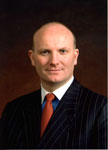 Declan Ganley
Declan Ganley
Amazingly, Declan Ganley actually manages to out-shady McEvaddy, no mean feat.
The potted narrative that one can find about him from the Internet has him showing up in the following 'business situations'
- In 1991 trading Russian Aluminium in Latvia [9].
- In 1996 he popped up in Albania, setting up the country's first private finance company, shortly before the economy collapsed on the back of pyramid schemes [11].
- By 1997, he was apparently the owner of the biggest Forestry holdings in Russia [10].
- in 2004 he got himself into trouble in Iraqi telecoms [12].
- in 2007 he attracted some negative attention for paying for trips by officials in the US department of Homeland Security [13].
Now what's interesting about these positions is that none of them were in what one might call 'normal market economies'. In fact, it would be fair to refer to them all as being environments where 'gangster capitalism' reigned. One does not prosper in such situations by having smart business plans and efficient production processes. One prospers by having access to decision makers and having friends in high places within the intelligence and security communities. The fact that "most Russian banks [had] their own private armies" in the 1990s and business takeovers tended to be of the armed variety underlines the point rather well [14].
This brings us on to Ganley's latest venture, Rivada Networks. If his previous career led one to the suspicion that he must be awfully well connected with the intelligence community, Rivada proves it in spectacular fashion.
Rivada Networks provides 'first responder' communications networks to the intelligence community and emergencey services. According to their website blurb, their clients include "USNORTHCOM, the National Guard Bureau, DHS, FEMA, multiple states, and various state and local agencies". Basically, their products promise to allow the various intelligence and emergency services to talk to one another in situations where much of the normal communications infrastructure may have been destroyed or damaged. This falls broadly under the remit of the Department of Homeland Security. It is an extremely sensitive area for a number of reasons. Firstly, it involves carrying confidential data between the various bodies that make up the US Intelligence Community. US intelligence bodies tend to be extraordinarily paranoid about the security of their electronic communications - achieving SIGINT dominance (signals intelligence, i.e. electronic snooping and counter-snooping) is the cornerstone of US intelligence strategy. The US intelligence agencies often refuse to share access to their data even with each other, never mind entrusting it to third parties. If they allow Ganley to carry their inter-agency communications, they must trust him an awful lot.
Rivada's Key Personnel
The reason for this trust is more obvious if one looks at the listing of "key personnel" on the Rivada website. A couple of the figures listed are the ordinary sorts that you expect to find on the average board of a technology company - a banker, a lawyer and a technologist, but the rest of the figures mentioned are significant figures within the US intelligence and military communities. The following section provides a few snippets - all taken verbatim from Rivada's webiste - highlighting some of the experience of Rivada's key personnel. This list highlights only those parts of their resumes which have significant strategic, military or intelligence components and leaves out the normal business stuff.
Lt. General Dennis M. McCarthy (Rivada Director)  Lt. Gen. Dennis M. McCarthy
Lt. Gen. Dennis M. McCarthy
- Commissioned a Second Lieutenant in 1967
- Transferred to the 9th Marine Amphibious Brigade in the Republic of Vietnam where he served as a Platoon Commander and Communications Officer in First Battalion, 13th Marines
- Served as G-3, 4th Marine Division in 1991, and commanded U.S. Joint Task Force, Chile in 1992
- From 1993 until 1995, General McCarthy was Commanding General of the Marine Corps Reserve Support Command
- Promoted to Major General on October 1, 1996, and was appointed to the Defense Reserve Forces Policy Board
- Assigned to the United States Atlantic Command, where he served as the Vice Director of Operations, and then in 1999 as Director of Operations & Plans.
- On June 1, 2001, he was promoted to the grade of Lieutenant General.
- He became Commander, Marine Forces Reserve, on Junhtttp://www.indymedia.ie/e 2, 2001
- Appointed Commander, Marine Forces North, on September 13, 2004 (head of all marines in the continental US).
- Resigned from the U.S. military in 2005
The image shows Lt. Gen. Dennis M. McCarthy, then commanding general, Marine Forces Reserve, visiting Task Force Tarawa, at Blair Airfield, Iraq , on Thursday May 1, 2003
John J. Kelly, Jr. (Director) 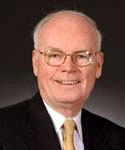 John Kelly
John Kelly
- founding director for the National D-Day Museum
- chairman of the Advanced Microstructures and Devices Foundation
- chairman of the National Security Industrial Association
- chairman of the Amphibious Warfare Committee
- chairman of the U.S. Navy League Industrial Executive Board.
A lot more biographical information on Kelly can be found on his Louisiana Technology Council Biography including details of his "top secret" security rating [15].
William J Atkins (Chief Financial Officer)
- was Chief Financial Officer of Intelsat, where he led the $5.2 billion sale of the company and associated financings and operational and strategic restructuring (Intelsat was the world's largest satellite company).
Rear Admiral Robert F. Duncan (Vice President, Business Development and Government Services) 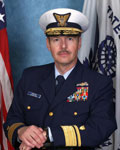 Rear Admiral Robert Duncan
Rear Admiral Robert Duncan
- Distinguished career in the United States Coast Guard spanning over thirty four years
- Served as Commander of the Eighth Coast Guard District, headquartered in New Orleans, Louisiana. As District Commander, he was responsible for U.S. Coast Guard operations covering 26 states, the Gulf of Mexico and the extensive U.S. inland river system.
- led the Commandant’s Task Force for Homeland Security
- appointed by Secretary Ridge to serve as the Federal Coordinator for the historic Iraqi voting
- also serves as a Director on the Joint Executive Boards of the National Institute for Urban Search and Rescue ( NIUSR) and the National Consortium for Readiness in Emergencies
Admiral James M. Loy (Director)  Admiral James Loy
Admiral James Loy
- The first Deputy Secretary of Homeland Security, a position that he held from 2003 to 2005.
- served in the Department of Transportation from 2002 to 2003 as Deputy Under Secretary for Security and Chief Operating Officer of the Transportation Security Administration (TSA), and later as Under Secretary for Security.
- retired from the U.S. Coast Guard in 2002, having served as its Commandant from May 1998.
- served as the Coast Guard Chief of Staff from 1996 to 1998
- From 1994 to 1996, he was Commander of the Coast Guard’s Atlantic Area, supervising U.S. forces during the mass Haitian and Cuban migrations of 1994
Don N. De Marino (Director) 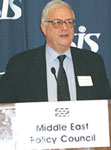 Don De Marino
Don De Marino
- From 1985-1987, Mr. De Marino served in the Reagan Administration as Director of the U.S.-Saudi Arabian Joint Economic Commission.
- During 1989-1990, Mr. De Marino served in the Bush Administration as Deputy Assistant Secretary of Commerce for Africa, the Near East and South Africa.
- Since 1991, he has served as chairman of the National U.S.-Arab Chamber of Commerce
- In 2004 served on the Personnel Evaluation Team to assess various operations in Iraq for the U.S. Secretary of Defense.
John Kneuer (Vice President, Strategic Planning and External Affairs) 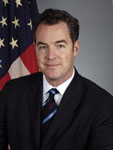 John Kneuer
John Kneuer
- Served as the Assistant Secretary of Commerce for Communications and Information
- Principal advisor to the President of the United States on telecommunications policy and the Administrator of the National Telecommunications and Information Administration ("NTIA").
James Tackett (Vice president for Homeland Security)
- Spent over 20 years in the United States Air Force (USAF) as a Communications-Computer Officer providing services to the U.S. Northern Command
- Over 25 years of experience in all aspects related to homeland security and command, control, communications, and computers
- Adjunct professor at the United States Air Force Academy and the National Defense University
Summary of Rivada Personnel
It should be noted that the above listed affiliations may have a few omissions. Members of those specific agencies that make up the US Intelligence Community [16] do not normally advertise their roles. However, there are a number of common euphemisms which are often used to describe such roles. For example, a job description of "Communications-Computer Officer providing services to the U.S. Northern Command" probably signals that the individual was an officer in the Air Force Intelligence, Surveillance and Reconnaissance Agency [17].
Still, even without specific information on the intelligence community experience of Rivada's Key personnel, it is obvious that they must have a wealth of knowledge from across a broad range of Intelligence Agencies. Even from a brief reading of their public biographies, one can be certain that Rivada's key personnel have intimate, top-level knowledge of a wide range of intelligence agencies, from the Coast Guard Intelligence Agency [18] to the National Geospatial-Intelligence Agency [19], by way of the Marine Corps Intelligence Activity [20] and the Office of Intelligence and Analysis [21] of the United States Department of Homeland Security [22]. Indeed, the fact that their "key personnel" have high level experience across such a broad range of intelligence agencies is probably critical to the company's commercial success, given the sensitivity of the task.
Nor are these people doddery old generals getting a few quid on top of their pensions for sitting on a board. They were all, until joining Rivada, in extremely senior security and intelligence positions - the number 2 official in the department of Homeland Security and the number 2 officer in the Marine Corps both joined Rivada directly from their state security jobs. These are extremely influential people within the US security and intelligence services.
The reason for such a military-intelligence top-heavy personnel list is not hard to discover. The US intelligence services need to know that they can have absolute trust in those who handle their communications. By appointing key personnel from within a broad range of the US intelligence agencies, Rivada is in a position to reassure the paranoid within the intelligence community. There's just one problem - the president, a man called Declan Ganley.
If you read Ganley's accounts of his business history - how he made it - one thing jumps out at you. In none of his business ventures does he mention any dealings with the US military or intelligence community. He's an entrepreneur who claims to have amassed great wealth through his keen business sense and none of the areas in which he claims to have made money had anything obviously connected with the military. This begs a few questions:
- How does a man from Tuam with no history of dealings with the US persuade a gallery of the most senior security and intelligence figures to join his board?
- How does a man from Tuam who has, by his own account, never done anything to help the US military, get given responsibility for the US intelligence community's emergency inter-agency communications?
Finally, it is once again worth noting that, like McEvaddy, all of Ganley's business dealings have been carried out through 'private equity' companies. Thus there is no way of knowing how much money he has, nor who actually owns the companies he leads.
The Libertas Campaign
Now all of the above would be merely curious if it were not for the peculiar nature of the Libertas Campaign. It has all the appearances of what has come to be known as an astroturf campaign [23] - a manufactured grassroots movement, created for PR and marketing purposes.
Libertas appeared on the Irish political scene out of the blue in 2007. It did not have public meetings, membership drives, policy debates or any of the other stuff that real political movements do when they are in formation. It appeared fully-formed, complete with a fully-developed policy and communications strategy. It has concentrated heavily on attracting media attention through a barrage of sensationalist press releases and PR stunts and photo-opportunities. It has generally failed to participate in public debates, on one occasion even claiming that it was unwilling to share a stage with Sinn Fein [24].  Dodgy Posters
Dodgy Posters
Belatedly, Libertas has decided to talk to the people and is currently engaged in a National Tour [25]. It will hold 15 meetings in 5 days in 12 towns. However, rather than being public debates, these meetings are fully organised by Libertas with no opposition voices present. They are also organised at most peculiar times. Their meetings in Castlebar, Roscommon, Athlone and Drogheda all take place at 7.30 am. Their other scheduled meetings start at 1.15pm (Navan, Mullingar, Longford, Sligo) and 6.30pm on weekdays (Castleblaney, Letterkenny, Dundalk, Tallaght). If you were trying to get as small a crowd as possible, yet be able to claim that you had held public meetings, you would be hard-pressed to find better time-slots. Or maybe I'm wrong, maybe the good citizens of Roscommon were queuing down the road to hear about the Lisbon treaty on Tuesday morning at 7.30 am. 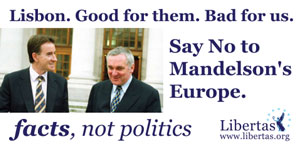 More Dodgy Posters
More Dodgy Posters
Another peculiar factor about the Lisbon Campaign is the relatively poor calibre of their material and personnel. Apart from Ganley and McEvaddy, the only people who seem to be involved with Libertas are a number of paid staffers who are employed to run the campaign. Most of these are themselves ex-members of the Freedom Institute, which was a right wing think tank set up by a number of neo-con sympathising students. The ex-freedom institutors on the Libertas staff include David Cochrane, who owns politics.ie and John McGuirk, a famously poor communicator, who has apparently been employed for his PR skills. Ganley and McEvaddy are themselves far from convincing media performers. Being business people, they are used to interviews that are sycophantic in the extreme and they seem completely incapable of appearing convincing when challenged. Their few personal appearances on serious current affairs shows, with experienced opponents or hosts have been very unconvincing to put it mildly.
By basing their staff on such an inexperienced group with no history of success in electoral campaigns, Libertas have got far less for their buck than one might expect. Their posters are amateurish, their slogans are inelegant and the general tone of their propaganda is far below what one would expect of a campaign backed by such resources. One might hazard a guess that they have been unable to attract major players with mainstream experience due to the fact that they are seen as politically poisonous and have had to make do with the help of a group of young-turks who are none too discerning about who they are working for. It is known that they have approached several more prominent political figures but have thus far failed to entice any of them aboard the good ship Libertas. In particular, their attempt to attract Michael McDowell ended in publicly humiliating failure [26].
The Libertas Message
On close examination of the propaganda that Libertas has produced about the EU, it is impossible to avoid the impression that they don't really believe the stuff that they are saying. 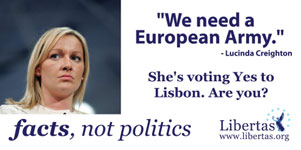 Anti-Militarist Military Contractors
Anti-Militarist Military Contractors
Probably the best example was their poster attacking Fine Gael's Lucinda Creighton for her support of an EU army [27]. This poster attempted to play on Irish fears about EU militarisation and the desire to retain Irish military neutrality. The idea that either Ganley or McEvaddy are anti-militarists is simply laughable, given the fact that their companies exist as devoted suppliers of the US military and intelligence services.
Another good example of the huge gap between what Libertas says and what Ganley and McEvaddy do relates to democracy and accountability. Both of them have focused on the so-called democratic deficit in the EU and the lack of accountability and transparency of its workings [28,29]. Now Libertas, unlike normal political groups, appears to have no members beyond the president Ganley, meaning that all policy is decided without any of the democratic and accountable elements that exist in ordinary political groups. It was formed, without any public participation, discussion or open meetings but with a policy that was already fully formed. Furthermore, Libertas has promised to spend 1.5 million [30] and it is obviously very well resourced as it has bought up billboards and advertising space across the country. Yet, nobody has any idea where the money is coming from and Libertas aren't saying. Campaign funding rules forbid any one individual donor from giving more than a few thousand euros.
Thus, we can not find even have the merest hint of internal democracy or transparency within Libertas and if you look at Ganley's and McEvaddy's companies, you find even less traces of democracy or accountability - they are purely private affairs, completely opaque to the public, without the merest whiff of democracy or accountability about them. Thus, it is simply impossible to take their new-found passion for transparency, democracy and accountability at face value.
One major argument that Libertas has raised throughout the campaign is the idea that Lisbon is bad for business [31], anti-competitive and likely to destroy Irish foreign direct investment by over-regulation and the harmonisation of EU tax rates [32]. The specific claims are based on what are quite frankly total nonsense about the details of the treaty, and the general argument is hugely undermined when one considers that both IBEC and the American Chamber of Commerce in Ireland (which represents US multinationals here) are both unreservedly supportive of Lisbon [33,34] and directly contradict many of Libetas' claims [35].
Another bit of disingenuous campaigning by Libertas has been their 'all things to all people' scaremongering. In the midlands, they have pushed the idea that the Lisbon treaty might bring in abortion [36] (which is demonstrably false, by the way), elsewhere they have presented themselves as libertarian [37].
So, clearly, any examination of the positions of Libertas and Ganley and McEvaddy would lead us to conclude that there is very little chance that their arguments are honest. It seems very unlikely that they actually believe the things that they are advocating. So, what is their motive then?
The Motives of Ganley and McEvaddy?
The question remains, why on earth have two determinedly non-public business figures such as Ganley and McEvaddy stepped into the political spotlight now?
Firstly, from the above, it is clear that they do not hold the positions that Libertas has raised against Lisbon. They simply aren't pacifist, pro-lifer, fundamentalist democrats. It is also clear, from their willingness to use scaremongering about abortion and tax harmonisation, that they are trying to maximise the No vote and don't really care on what basis people reject the treaty. The use of arguments that are directly contradictory to one another is convincing evidence of this.
So, why are they trying to defeat Lisbon? Given their intimate relationship with the US intelligence and military community, it is reasonable to ask whether this might provide any clues to their underlying motives. And it proves to be a fairly fruitful avenue of enquiry. In order to properly understand the context, we must briefly touch upon the major strategic divide amongst the world's business and political elite on matters European.
To put it simply, there are two visions of European integration amongst the Western elite. One of them sees the EU as a common market, lacking any real political component beyond whatever is needed to keep the wheels of competition well-oiled and lacking any capacity for autonomous strategic action. The other vision is of a European super-state, with sovereignty over the member states and the ability to take collective and coherent military and strategic actions on the global stage.
The first vision is that of the US military and intelligence community and of NATO. An EU with autonomous strategic capacity would essentially undermine NATO and the US's permanent leadership position on all things security related. Within Europe, there are factions in most countries who are sympathetic to this position - the Euro-skeptic Tories in the UK being a good example. There are also a number of powerful US-based business people who are ardent supporters of the NATO security system (often known as Atlantacists), Rupert Murdoch being the best known.
The second vision is that of the mainstream of European mainland business and political interests. For most of them it's a no-brainer. The French and German car-manufacturers look across the Atlantic and see how helpful a powerful strategic state can be in delivering stuff like cheap consumer petrol which serves in practice as a huge subsidy to their competitors in US industry. European politicians, for their part, would like to be taken seriously in international affairs and are probably pretty browned off with the US ignoring them and publicly humiliating them, as was the case recently when the EU wasn't even consulted with before Kosovo - which is part of Europe after all - declared its independence under US patronage.
So, anyway, having briefly explained the major divide in global elite opinion on the general vision of EU integration, we can see whether it holds true in this particular case - a treaty that undeniably advances the process of EU political integration. As it happens It does. Amongst all the unanimity of support from the world's business communities and amongst mainstream European politicians, we can find some consistent sour notes from the US Intelligence Community [38] and politicians representing NATO [39]. Indeed, globally, it is striking that those representing US security thinking are the only elite voices against Lisbon.
One final bit of background is worth considering. In recent years there has been a large expansion in the use of foreign-owned contract companies by the US military. This has caused something of a backlash amongst 'patriotic' US politicians (and the US industries that fund them). For example, in 2006, there was a storm of criticism at the prospect of Dubai Ports World taking over the running of New York Container Port [40], criticism which caused the sale to be blocked due to the security implications. Currently, US lawmakers are considering new, stricter legislation on regulations governing foreign-owned companies access to confidential data [41]. This has inevitably created significant pressure on foreign owned military contractors to demonstrate their loyalty.
Ganley Spills the Beans
So, at this stage we've established a few things. The figures behind Libertas are extremely closely connected to the US military and Intelligence community; their arguments appear to be clearly disingenuous; the US military and intelligence community are indeed opposed to the treaty. The facts are, by themselves, strong circumstantial evidence in favour of the idea that Ganley and McEvaddy's connections to the US military provide the underlying motives for opposing Lisbon. But can we do any better? Can we turn up any positive evidence to support our tentative conclusion?
As it happens, we can. In December 2003, Ganley published an article about the forthcoming EU constitution (which eventually morphed into the Lisbon treaty) in a publication of the US Foreign Policy Research Institute (FPRI). The FPRI is an influential US foreign policy think-tank, which publishes "scholarship" designed to promote "the development of policies that advance U.S. national interests" [42]. Ganley's article was thin on details and heavy on cliche-ridden rhetoric. The one practical problem that he identified with the direction of the EU was the lack of a popularly elected president. One of the few specific problems that this might cause was the following:
"Of course, the (non-popularly elected) president and his or her foreign minister would be unlikely to display what Chirac earlier this year identified as the "bad behavior" and signs of being "badly brought up" of the annoying, democratically elected leaders of Central and Eastern European states." [43]
When this was written, back in 2003, US politicians were busy deriding 'old Europe' for its failure to get on board their Iraq adventure. The US was much more successful in winning over the leaders of "new Europe" - predominantly the newly acceded Eastern block countries - to support their invasion despite the fact that their populations were vehemently opposed to it. The reference to this being 'democratic' is Orwellian in the extreme. The political powers in the core EU states were simply strong enough to resist the US demands that they should ignore the will of their people and join the invasion, while those in the Eastern states simply didn't have the diplomatic, strategic, institutional or political strength to ignore the pressure from the global superpower.
Ganley's underlying message is clear - the more tightly integrated the EU is politically, the harder it will be for the US to influence it. The non-popularly elected president will be able to resist the 'bad-behaviour' of supporting US imperial adventures. Thus Lisbon does not "advance US national interests".
This conclusion is further strenghtened by a reading of the various declassified documents and briefings that the US Intelligence Community have issued. For example, in January 2008, the well known defense analysts, Jane's, published an article describing how "EU treaty worries US intel services". An extract from that article, below, shows them making a very similar point to Ganley - namely that the US finds it much easier to deal with individual countries (bi-lateral links) than it does from the EU state machinery. This is a natural consequence of the reduced imbalance in forces between the EU and the US compared to that between the US and any individual EU member state.
"US intelligence community officials, US law enforcement agencies and the Department of Homeland Security routinely praise their European counterparts for using various bilateral mechanisms to pursue joint initiatives encompassing non-proliferation, immigration and other counterterrorism-related issues.
In contrast, Washington-based policy makers regularly criticise EU-wide bodies for proving at best ineffectual - and at worst downright disruptive - in their efforts in the 'global war on terrorism'. Common criticisms include an inability to determine an appropriate point of contact for US officials in Brussels - a perception that many Europeans are misguidedly seeking a negotiated solution to the 'war on terrorism' and excessive preoccupation on the part of EU lawmakers with protecting the privacy of EU nationals suspected of engaging in terrorist-related activities.
US intelligence and security officials have been able to circumvent EU institutions in many cases so far by relying extensively on formal and informal arrangements with the individual member governments. In addition, Washington has felt confident that its European allies would use their powers to veto unwelcome EU-wide proposals in areas related to security and defence. If adopted, the Lisbon treaty could threaten many of these arrangements. ". [27]
Now, we come to the crunch. Towards the end of his FPRI article, Ganley pitches the following idea:
"The convention can only be countered with a true and fair vision for a United Europe. Europeans who until now have kept their views to themselves should mobilize to stop this tide. They must overcome groupings and parties based on legacy national organizations to form a new organization and articulate a clear and achievable vision for Europe’s future. Rather than try to define itself in contradistinction to the United States, this new Europe must be an equal partner and influence for the worldwide extension of justice and liberty. Such a political party— I will for the sake of discussion call it “Libertas” - will need to challenge the engrained composition of the convention in local and regional elections, as well as running candidates at member-state and EU levels. The old structures need shaking up."
There we have it. Ganley first pitched the idea of Libertas in the context of a journal devoted to research that "advances US National Interests" and with an audience that consists mainly of US strategic decision makers. The obvious inference is that Libertas was conceived of as an instrument to advance US National interests - otherwise the choice of publication venue makes no sense whatsoever.
Conclusion
This article has examined the reality behing the Libertas campaign, the connections of its two high-profile backers, the implausibility of its message, the peculiar nature of its campaign and some of the underlying strategic differences at play. The conclusion is that the evidence suggests that Libertas is most likely to serve primarily as a vehicle for advancing US strategic interests. However, it is important to remember that while this is the most likely and most plausible conclusion about the underlying forces at play, it is impossible to ever be certain about any individual's motivation. It is possible that both Ganley and McEvaddy are both entirely genuine in their stated reasons for opposing Lisbon - although that would mean that they are also seriously stupid and completely incapable of understanding many of the elementary facts about the treaty. There's also the possibility that some other underlying motive is at play, but the evidence seems to points towards the Pentagon.
All of the material in this article is in the public domain. Ironically, the source of some of the information contained herein is David Cochrane's politics.ie site where more speculative and less well substantiated versions of this argument have been published over the last few weeks: see here: http://www.politics.ie/viewtopic.php?f=172&t=34169 (hat-tip to ibis) It is interesting that despite all of this material being in the public domain, it has been Internet posters who have raised it, while the media has essentially provided Libertas with mountains of coverage, without bothering to even check as to whether it's a real campaign at all. That's because the Irish media does little other than recycle press releases, and is utterly cowardly when dealing with stuff that might annoy powerful people.
Finally, for those who might suspect that this is a hatchet job aimed at discrediting the No Campaign. I am actually a No campaigner myself. See here: http://www.indymedia.ie/article/86857
Ordered References
- http://www.libertas.org/content/view/264/1/
- http://integrator.hanscom.af.mil/2006/July/07132006/07132006-16.htm
- http://www.independent.ie/national-news/brothers-with-altitude-400889.html
- http://www.rte.ie/news/2007/0114/knock.html
- http://www.cinews.ie/article.php?artid=3126
- http://www.dsca.mil/PressReleases/by-date/2007/031907.htm
- http://www.defenselink.mil/contracts/contract.aspx?contractid=3731
- http://www.rte.ie/news/1999/0829/harney.html
- http://archives.tcm.ie/businesspost/2006/03/19/story12731.asp
- http://www.entrepreneursforgrowth.org/AA8D8/Board/Declan_J_Ganley.aspx
- http://business.timesonline.co.uk/tol/business/article1061337.ece?token=null&offset=0
- http://www.indymedia.ie/article/87241
- http://www.usatoday.com/printedition/news/20070823/1a_lede23_dom.art.htm
- http://www.independent.co.uk/news/business/news/so-has-the-russian-mafia-finally-met-its-match-617246.html
- http://www.ltc-la.org/en/cms/?57
- http://en.wikipedia.org/wiki/United_States_Intelligence_Community
- http://en.wikipedia.org/wiki/Air_Force_Intelligence%2C_Surveillance_and_Reconnaissance_Agency
- http://www.uscg.mil/History/faqs/CGI.html
- http://en.wikipedia.org/wiki/National_Geospatial-Intelligence_Agency
- http://en.wikipedia.org/wiki/Marine_Corps_Intelligence_Activity
- http://en.wikipedia.org/wiki/Office_of_Intelligence_and_Analysis
- http://www.dhs.gov/index.shtm
- http://en.wikipedia.org/wiki/Astroturfing
- http://www.ireland.com/newspaper/ireland/2008/0326/1206144724894.html
- http://www.libertas.org/content/view/257/132/
- http://www.ireland.com/newspaper/ireland/2008/0128/1201301321279.html
- http://www.libertas.org/content/view/253/127/
- http://www.libertas.org/content/view/264/127/
- http://www.libertas.org/content/view/259/127/
- http://archives.tcm.ie/businesspost/2008/01/27/story29928.asp
- http://www.libertas.org/content/view/252/131/
- http://www.libertas.org/content/view/256/127/
- http://www.belfasttelegraph.co.uk/breaking-news/ireland/business/article3588838.ece
- http://www.amcham.ie/article.cfm?idarticle=519
- http://ibec.ie/ibec/press/presspublicationsdoclib3.nsf/wvIBECLatestNews/48B82159CE2861668025742B004B573D
- http://www.politics.ie/viewtopic.php?f=172&t=34175
- http://www.libertas.org/content/view/84/90/
- http://www.janes.com/news/publicsafety/jid/jid080117_1_n.shtml
- http://www.conservatives.com/tile.do?def=news.story.page&obj_id=142045
- http://www.nytimes.com/2006/02/28/opinion/28flynn.html
- http://thehill.com/business--lobby/foreign-dod-contractors-under-lens-2008-04-16.html
- http://www.fpri.org/about/
- http://www.fpri.org/ww/0405.200312.ganley.euconstitution.html

